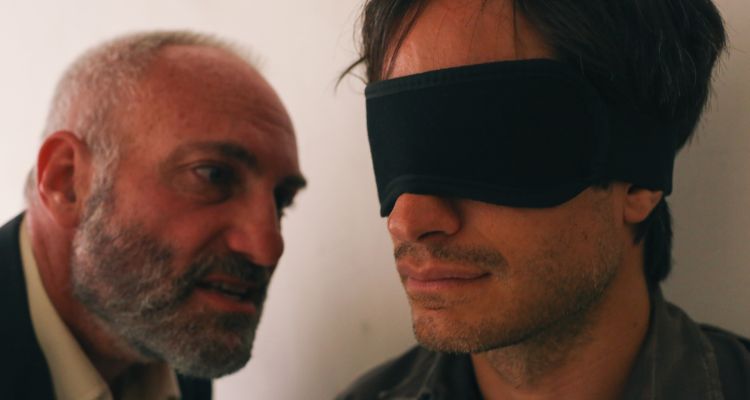 (3 / 5)
(3 / 5)
As the directorial debut of a man better known for political satire than drama – The Daily Show’s long-time, recently abdicated host Jon Stewart – Rosewater is a suitably timely work of dramatized non-fiction.
It tells the story of Maziar Bahari, an Iranian-Canadian journalist imprisoned by the Ahmadinejad regime for 118 days following Iran’s controversial 2009 elections. It’s a narrative in which Stewart himself played a small but crucial role: Bahari’s satirical interview with The Daily Show’s Jason Jones was levied against him during his captivity as proof of his being a spy.
Rosewater opens with a flashback to Bahari’s childhood, a visit to the Shrine of Masumeh in Qom with his free-spirited older sister Maryam (Golshifteh Farahani). As narrated by the older Bahari (Gael García Bernal), it’s here that he first experienced the scent of rosewater, which he came to associate with piety.
Though the film isn’t explicit about this, it’s a scent Bahari would later come to associate with his captor (Kim Bodnia) during their interrogations – grey and stocky, and with Bahari himself mostly blindfolded, there’s little else to distinguish him from the rest of the functionaries at Evin Prison.
Awoken at his mother’s home by another, grey-suited functionary with the ominous phrase “We are here now”, Rosewater details the chain of events that led to Bahari’s arrest. From his arrival in Tehran, leaving behind his pregnant wife Paola (Wolf Hall’s Claire Foy), to his interviews with a glib shark-eyed spokesperson for the Ahmadinejad campaign (Amir El-Masry) and supporters of Mir-Hossain Mousavi’s popular opposition, like the politically aware Davood (Dimitri Leonidas), who becomes Bahari’s unconventional chauffeur. There’s rejoicing in the streets, a sense of hope.
Bahari himself is cautiously optimistic, despite the cynicism of his beloved mother Moloojoon (Shohreh Aghdashloo). Bernal portrays Bahari with an intense, albeit slightly sheepish, integrity. When his DVD of The Sopranos and Leonard Cohen LP are denounced as “porno” – the film flashes to his enjoying the former with Paola; the latter, a gift from his deceased sister – Bahari offers a bemused defense, though he concedes that a copy of Empire with a scantily clad Megan Fox on the cover may fit the bill. Bahari is canny enough to know when to stop filming and when to shut up.
This is a lesson, we learn, that has come at great cost: his stern yet kindly father Baba (Winter Sleep’s Haluk Bilginer) was imprisoned as a Communist, as was his sister Maryam. They appear to Bahrani, memories projected on the walls of Tehran and apparitions in his cell. Baba, who proudly gave his interrogators nothing, encourages him to hold out, but, unlike his father, Bahrani has nothing to confess.
Growing increasingly bedraggled and weary as time wears on, faced with obstinately uninformed questions like “Who is Anton Chekov?”, Bahari approaches breaking point.
Based on Bahari’s memoir, adapted by Stewart, Rosewater’s script takes a straightforward approach to the boredom and terror of captivity. Bahari’s bitter jobsworth interrogator offers him a Nescafé then, with the next breath, casually tells him he is to die.
We witness one mock execution – though it understandably knocks Bahari’s legs out from under him – and the beatings are infrequent, but the feeling of “business as usual” that permeates proceedings is all the more unsettling. Bahari’s arrestor declines the offer as tea so as “Not to inconvenience” Bahari’s self-possessing mother.
Stuart’s direction, meanwhile, is especially impressive for a first-timer, if a touch uninspired. The film is interspersed with real-life news coverage of the Green Revolution, as well as Bahari’s POV-style camera footage as caught from the back Davood’s motorbike. Amidst the green, open roads and vibrant murals of Tehran a revolution is brewing: blue hashtags – #recount, #protest – appear above the heads of pedestrians and stamped on the air itself. The end message seems to be that technology, as well as the media, has its role to play in supplanting tyranny.
Despite its more fanciful touches, Rosewater’s docudrama fidelity keeps it firmly tethered to the facts of the case (you’d assume Stewart’s slight connection to the case would ensure a respectful recitation). Howard Shores’ Middle Eastern-themed score lifts and lilts and Bobby Bukowski’s crisp yet ethereal cinematography turns Bahari’s white cell into a purgatorial space – Arabic graffiti on the wall, helpfully captioned, reads “God have mercy on me.”
In the end it is Bahari himself who is able to escape by letting go of the past, in daring to try something else; if only to speak.
